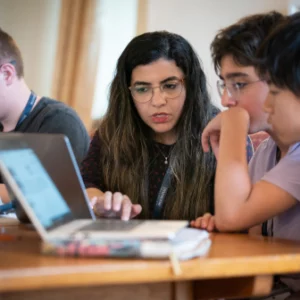Pioneer Academics runs the Pioneer Research Institute (PRI) and Global Problem-Solving Institute (GPSI), selective online programmes for high school students worldwide.
Both are credit-bearing and focus on research or innovation under the supervision of university professors.
Accredited through Oberlin College & Conservatory (PRI) and partnered with UNC Chapel Hill (GPSI), Pioneer offers students the chance to complete research papers or team-based innovation projects, entirely online.
Here’s a comprehensive guide to Pioneer Academics in 2026.
Course Breakdown
| Programme Option | Who’s it for? | Duration | Subjects/Themes | Outcomes | Cost (2026) |
| Pioneer Research Institute | High school students (Grades 9–12) | 12 or 25 weeks | 30+ academic fields (STEM, Humanities, Social Sciences, Arts) | Original research paper; up to 4 Oberlin credits; chance of publication (2%) | US$7,285 (+ possible lab fee ≤2%) |
| Global Problem-Solving Institute (GPSI) | High school students (Grades 9–12) | One academic term (Spring, Summer, Fall) | Global challenge themes (AI, climate, public health, water systems, food security) | Team solution project; 2 UNC Chapel Hill credits; pathway into PRI | US$3,100 |
Note: Check their official website for their current pricing.
Why Choose Pioneer Academics?
Pioneer Academics markets itself as a rigorous, selective, and credit-bearing enrichment programme designed for ambitious high school students.
Through its accredited pathways, participants who complete the Pioneer Research Institute with a grade of C- or higher can earn four Oberlin College credits and receive an official transcript, while those enrolled in the Global Problem-Solving Institute (GPSI) can gain two credits from UNC Chapel Hill.
The programme is built on a structured mentorship model that begins with small international cohorts of no more than six students and then progresses to one-to-one supervision with professors.
Students join from more than 70 countries, forming a truly global community that mirrors the diversity of higher education.
The academic outcomes are equally substantial: participants produce research papers or project proposals that reflect the standards of undergraduate work.
Pioneer also highlights its alumni success, noting that 71% of graduates are accepted into “Top-20” universities, though the definition of such rankings can vary.
Immerse Education shares Pioneer’s focus on academic depth and mentorship, but complements it with opportunities for in-person immersion.
Our Online Research Programme offers both 1:1 and group formats, with accredited pathways awarding eight UCAS points (UK) or three US college credits, and group tracks that build collaboration and presentation skills alongside independent research.
Key Features of Pioneer Academics
Pioneer Academics offers two main pathways: the Pioneer Research Institute (PRI), which is research-focused, and the Global Problem-Solving Institute (GPSI), which emphasizes innovation.
PRI is highly selective, admitting fewer than one-third of applicants, while GPSI requires a minimum GPA of 3.3 and strong English proficiency. The final outputs differ: PRI culminates in a substantial research paper with a chance of publication, while GPSI produces a collaborative solution project alongside individual reflections.
The Research Institute is Pioneer’s flagship programme, structured around a cohort-to-mentorship model across 30+ disciplines. Students engage in methodology seminars, access extensive undergraduate digital libraries, and develop original research questions under one-to-one professor guidance.
Over 12 weeks for the summer term, and 25 weeks for the spring to summer term, they complete a full-length research paper and, if successful with a C- or higher, earn four Oberlin College credits.
Advantages
- Accredited College Credit: A rare feature for high school enrichment programmes.
- Wide Subject Range: 30+ academic areas at PRI; interdisciplinary themes at GPSI.
- Highly Selective: Admissions process signals prestige.
- Strong Preparation for Research: Teaches methodology, writing, and analysis at the university level.
- Pathway Between Programmes: High-performing GPSI students get priority consideration for PRI.
Disadvantages
- Online Only: No in-person cultural immersion or residential experience.
- Publication Not Guaranteed: Only ~2% of research papers reach the Pioneer Research Journal.
- Time Commitment: 12 or 25 weeks of research can be intensive alongside school.
- Selective Admissions: Many applicants are not accepted, reducing accessibility.
Pioneer Academics vs Immerse Education
Immerse Education offers three core pathways: Academic Insights, Career Insights, and the Online Research Programme (ORP), combining university-style learning, real-world experience, and one-to-one research mentorship across global locations.
| Feature | Pioneer Academics | Immerse Education |
| Age Range & Audience | High school students, Grades 9–12 (14–18); geared toward highly motivated, research-oriented learners | Students aged 13–18; includes both academically ambitious learners and those exploring careers or university pathways |
| Admissions | Highly selective; <⅓ accepted to Research Institute; GPSI requires GPA ≥ 3.3 and strong English | Selective but more accessible; emphasis on motivation and potential rather than rigid GPA cut-offs. Recommended: upper-intermediate (B2) English proficiency |
| Teaching & Mentorship | Small cohort seminars followed by 1:1 professor mentorship (Research Institute) or team projects with facilitators/professors (GPSI) | Oxbridge-style tutorials in small groups (avg 7), 1:1 mentoring in Online Research Programme, plus guest lectures and workshops |
| Class Size | Cohorts capped at 6 students; 1:1 research mentorship | Tutorials average 7 students; Online Research Programme is 1:1 or small group |
| Academic Depth | Research-intensive; focused on producing a full-length paper or innovation project at university level | Broad: deep subject insights (Academic Insights), hands-on career projects (Career Insights), or personalised research (Online Research Programme) |
| Career Pathways & Outcomes | Alumni highlight acceptance to top global universities; limited career exposure beyond research | Career Insights integrates industry visits, networking, and real-world projects in Cambridge, London, New York, San Francisco, Singapore, Sydney, and Tokyo |
| Credit / Recognition | Up to 4 Oberlin College credits (Research Institute); 2 UNC Chapel Hill credits (GPSI); official transcripts | Students can earn 8 UCAS points (residential and online) and 3 college credits (online), with potential recommendation letters and recognised Oxbridge-style academic experience enhancing university applications. |
| Deliverables | Research Institute: full-length paper (2% published in Pioneer Journal) | Online Research Programme: independent research paper; Academic Insights: essays/presentations; Career Insights: industry project portfolios |
| Learning Environment | Fully online; synchronous + asynchronous work with global cohorts | Residential programmes in Boston, Cambridge, London, Oxford, New York, San Francisco, Singapore, Sydney, Tokyo, and Toronto; also flexible online options |
| Cultural & Industry Exposure | None — online only | Rich cultural excursions, workplace visits, and industry mentorship in global cities |
| Online Options | Core model (PRI & GPSI entirely online) | Online Research Programme (1:1 or small group) with Oxbridge/Ivy League mentors |
| Best For | Research-driven students seeking selective, credit-bearing online experiences | Students wanting rigorous academics plus cultural immersion, industry exposure, and social interaction in world-class cities |
Is Pioneer Academics Worth It?
For high school students seeking college credit and a structured research pathway, Pioneer Academics offers academic rigour and selective prestige.
Earning Oberlin or UNC credits while still in school is a rare advantage, and the combination of mentorship, publication potential, and research training provides strong preparation for competitive university applications.
The Research Institute best suits students eager to pursue a defined research question, while GPSI appeals to those interested in collaborative problem-solving. Both require maturity, independence, and strong self-discipline, given their virtual, university-level format.
That said, the fully online delivery and competitive admissions may not suit every family. Students seeking cultural immersion, face-to-face mentorship, or hands-on career exploration may prefer alternatives.
In that case, Immerse Education’s residential Career Insights programmes with industry visits, project work, and guest lectures, or its shorter Online Research Programme that offers shorter, more adaptable timelines, making it easier to balance with school schedules while still producing a tangible academic output.
Alternatives to Pioneer Academics
- Immerse Education – Online Research Programme: 1:1 mentored research with Oxbridge/Ivy League tutors; flexible subjects and schedule.
- Immerse Education – Academic Summer School: Oxbridge-style teaching in Oxford, Cambridge, or Sydney; small-group tutorials across 20+ subjects.
- Immerse Education – Career Insights: Hands-on, project-based learning in London, Boston, and Singapore with industry visits.
- Oxford Royale Academy: Broad academic summer school with boarding and cultural activities.
- King’s College London Pre-University School: Subject-focused summer courses in a Russell Group environment.
How to Apply for Pioneer Academics
Research Institute (2026):
- Attend an Information Session – Join an online info session to understand the programme’s structure, requirements, and expectations.
- Submit Application – Complete the online application with personal details, academic interests (up to four areas), essays, unofficial transcript, and teacher/counselor recommendation. Standardised test scores are optional.
- Initial Screening – Applications are reviewed for academic readiness and fit. If you pass, you’ll be asked to submit official transcripts and recommendation forms.
- Interview & Writing Assessment – Shortlisted students complete a video interview and a proctored, timed writing task to demonstrate motivation and communication skills.
- Admissions Decision & Enrollment – After holistic review, Pioneer issues decisions (admit, waitlist, deny). Admitted students confirm with a deposit, receive placement in a discipline, and begin onboarding for seminars and library access.
GPSI (2026):
- Choose a Theme & Apply – Select one global challenge theme (e.g., Analyzing AI, Plate & Planet). Submit your online application with a short essay, unofficial transcript, and teacher/counselor evaluation.
- Academic Review – Pioneer checks that applicants meet minimum requirements: GPA ≥ 3.3, no more than one C grade, and strong English proficiency.
- Holistic Evaluation – Applications are reviewed for motivation, teamwork potential, and fit with the innovation-focused curriculum.
- Admissions Decision – Offers are made on a rolling basis until spots are filled. Students may be admitted, waitlisted, or declined.
- Confirm & Begin Onboarding – Admitted students confirm their place, pay tuition (or scholarship deposit), and gain access to the GPSI platform, schedules, and pre-course resources.
Final Thoughts
Pioneer Academics provides prestigious, credit-bearing, online research opportunities that prepare students for the academic demands of university. Its strengths lie in its selectivity, structure, and accreditation.
Yet, for students seeking a holistic experience, academic depth, cultural immersion, career exposure, and global networking, Immerse Education offers a richer alternative.
With pathways across Oxford, Cambridge, London, Sydney, and leading global cities, Immerse blends rigorous academics with cultural exploration and industry engagement, giving ambitious learners a well-rounded pre-university experience.




















